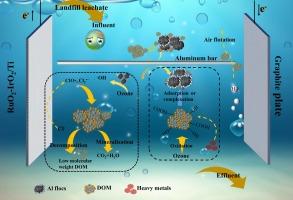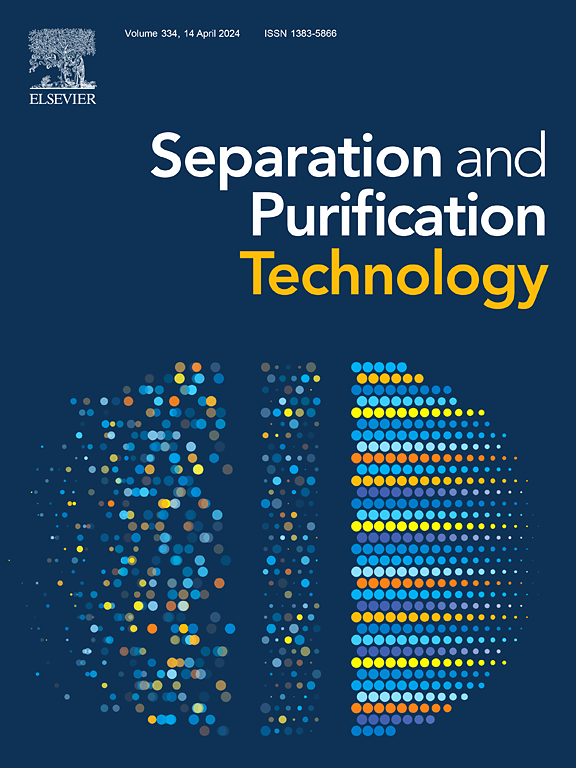Mechanism and molecular level insight of refractory dissolved organic matter in landfill leachate treated by electroflocculation coupled with ozone
IF 8.1
1区 工程技术
Q1 ENGINEERING, CHEMICAL
引用次数: 0
Abstract
Landfill leachate usually contains a substantial content of refractory dissolved organic matter (RDOM), which mainly consists of humic acid and fulvic acid. RDOM easily blocks the membrane pores resulting in membrane fouling when treated using membrane technologies, and it costs abundant chemical regents using advanced oxidation processes. To achieve the economically efficient treatment of RDOM in landfill leachate, this study established the electroflocculation coupled with ozone (EFCO) system. EFCO achieved a higher removal for organic matter than single electroflocculation and ozonation, where RDOM was the main component of organic matter in landfill leachate. The remaining RDOM was decomposed into lots of micromolecule weight and biodegradable proteins and lipids. Ozone improved the removal of dissolved organic matter (DOM) mainly by changing the functional groups on its surface and improving the mechanical strength of flocs to enhance the complexation between flocs and DOM. Cl2![]() − and ClO
− and ClO![]() produced in the EFCO system were the main active chlorine species, which enhanced the mineralization of RDOM. The study provides an efficient method for the pretreatment of RDOM in landfill leachate.
produced in the EFCO system were the main active chlorine species, which enhanced the mineralization of RDOM. The study provides an efficient method for the pretreatment of RDOM in landfill leachate.

通过电絮凝和臭氧处理垃圾填埋场渗滤液中难溶有机物的机理和分子水平见解
垃圾填埋场沥滤液通常含有大量难溶解有机物(RDOM),主要由腐植酸和富里酸组成。在使用膜技术进行处理时,RDOM 很容易堵塞膜孔,导致膜堵塞,而使用高级氧化工艺则需要花费大量的化学调节剂。为了经济高效地处理垃圾填埋场渗滤液中的 RDOM,本研究建立了电絮凝加臭氧(EFCO)系统。在 RDOM 是垃圾渗滤液中有机物主要成分的情况下,EFCO 对有机物的去除率高于单一的电絮凝和臭氧处理。剩余的 RDOM 被分解成大量微分子重量和可生物降解的蛋白质和脂质。臭氧主要通过改变溶解有机物(DOM)表面的官能团和提高絮凝体的机械强度来增强絮凝体与 DOM 之间的复合作用,从而提高对溶解有机物(DOM)的去除率。EFCO 系统中产生的 Cl2- 和 ClO 是主要的活性氯物种,它们增强了 RDOM 的矿化作用。该研究为垃圾填埋场渗滤液中 RDOM 的预处理提供了一种有效的方法。
本文章由计算机程序翻译,如有差异,请以英文原文为准。
求助全文
约1分钟内获得全文
求助全文
来源期刊

Separation and Purification Technology
工程技术-工程:化工
CiteScore
14.00
自引率
12.80%
发文量
2347
审稿时长
43 days
期刊介绍:
Separation and Purification Technology is a premier journal committed to sharing innovative methods for separation and purification in chemical and environmental engineering, encompassing both homogeneous solutions and heterogeneous mixtures. Our scope includes the separation and/or purification of liquids, vapors, and gases, as well as carbon capture and separation techniques. However, it's important to note that methods solely intended for analytical purposes are not within the scope of the journal. Additionally, disciplines such as soil science, polymer science, and metallurgy fall outside the purview of Separation and Purification Technology. Join us in advancing the field of separation and purification methods for sustainable solutions in chemical and environmental engineering.
 求助内容:
求助内容: 应助结果提醒方式:
应助结果提醒方式:


